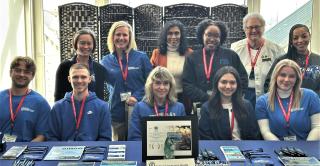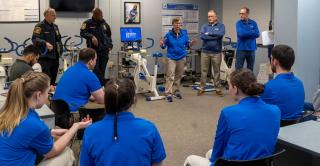
By Amy J. Barry
It began as a conversation with faculty and students on a call in President Toro’s office. It was soon after the murder of George Floyd by police in May of 2020.
“It was a listening session we were all in on,” recalls Dr. Aimee Pozorski, director of English Graduate Studies. “Students of color were discussing their sense of insensitivities on campus, awareness of injustices all around, and that it could be addressed more forcefully in the classroom.”
This rapidly led to the launch a Certificate in Racial Justice program in Fall 2021. The objective: To expand students’ understanding of systemic racism and gain skills for challenging racial injustice.
Faculty members that established the program with Pozorski include Evelyn Phillips, Anthropology; Susan Koski, Criminology and Criminal Justice; Audra King, Philosophy; Beth Merenstein, Sociology; Melissa Mentzer, English; and Alfred Rosete; Economics.
It soon became clear to the group that most of the courses needed to create the program were already being taught in various disciplines at Central. They just needed to be brought together under one umbrella.
To earn the 15-credit certificate, students can choose from 40-plus classes. The only required course is Racial Justice 200, which gives an overview of the issues the program will cover and can be taken independently to fulfill a general education requirement in Social Sciences.
Pozorski stresses that offering the certificate as an interdisciplinary, collaborative program takes the conversation to a higher level.
“For example, my training is in American literature,” she says. “So I may start with how representation of people of color, white supremacy in films, novels, TV, is directly related to how people engage in the world. And social scientists might start with, ‘How does systemic racism work at the level of politics? Who goes to cast a vote?’”
Wholehearted response
It was a gamble whether the program would be embraced.
It exceeded expectations.
“Classes are capped at 35 students. They were all filled,” Pozorski says. “And we’re talking about really difficult subject matter and hearing many different points of view.”
Pozorski says they were initially targeting students in majors who would be confronting these issues in their careers — criminal justice or education or pre-law — but found older adults, trans, and BIPOC students were also enrolling.
“It’s an economically, racially, geographically diverse demographic. It’s not something we consciously planned for, but it has been such a gift,” she says.
Because it’s open to both matriculating and non-matriculating students Pozorski would love for alumni, community members, and retirees to consider the certificate program.
She notes that the curriculum is constantly evolving and expanding.
“We focused first on African-American populations. Then faculty came forward to say we can talk about it in regard to anti-Semitism. And now we have a class on Asian American/Pacific Islanders. There’s so much to cover, we’re discussing turning the certificate program into a minor.”
Pozorski acknowledges that teaching of critical race theory and racial justice is a hot-button topic in the U.S. and another reason the program is so relevant to Central students.
“We have education majors enrolled. We have to unpack how you teach systemic racism in your classroom, in context of school boards, parents, the administration. It’s not enough to notice racism — the schools need to be anti-racist.”
Next steps
Pozorski hopes to have at least one speaker or event every semester to shine a light on racial justice issues. The first one, held Feb. 9, was hosted by the student Mosaic committee in collaboration with the Center for Africana Studies, and faculty of the Racial Justice certificate program. It featured Eddie Glaude, scholar of African American Studies, who discussed his new book “Begin Again: James Baldwin’s America and its Urgent Messages for Our Own.”
“It was a really cool convergence that allowed us to engage with students and alumni,” Pozorski says. “We opened it up virtually.”
Asked what she most hopes to see as a result of the new Racial Justice Certificate program, Pozorski says, “It’s such a cliché when educators say they’re doing important work. But I believe, as somebody who loves conversations about representation, culture, and history, how important it is for young people — who want to make a difference in their own lives, communities, and careers — to be able to have these conversations within an interdisciplinary framework.”



